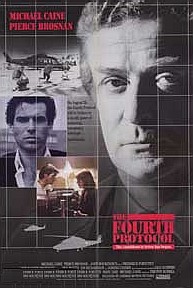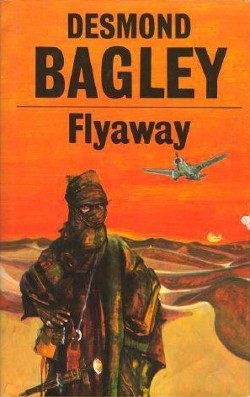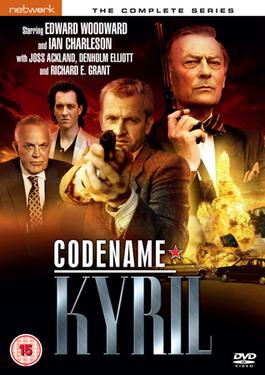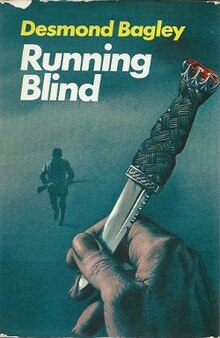
Harold Adrian Russell "Kim" Philby was a British intelligence officer and a double agent for the Soviet Union. In 1963 he was revealed to be a member of the Cambridge Five, a spy ring which had divulged British secrets to the Soviets during World War II and in the early stages of the Cold War. Of the five, Philby is believed to have been most successful in providing secret information to the Soviets.
Spy fiction is a genre of literature involving espionage as an important context or plot device. It emerged in the early twentieth century, inspired by rivalries and intrigues between the major powers, and the establishment of modern intelligence agencies. It was given new impetus by the development of fascism and communism in the lead-up to World War II, continued to develop during the Cold War, and received a fresh impetus from the emergence of rogue states, international criminal organizations, global terrorist networks, maritime piracy and technological sabotage and espionage as potent threats to Western societies. As a genre, spy fiction is thematically related to the novel of adventure, the thriller and the politico-military thriller.

Q is a character in the James Bond films and novelisations. Q is the head of Q Branch, the fictional research and development division of the British Secret Service.

Cold War espionage describes the intelligence gathering activities during the Cold War between the Western allies and the Eastern Bloc. Both relied on a wide variety of military and civilian agencies in this pursuit.

The Cambridge Five was a ring of spies in the United Kingdom that passed information to the Soviet Union during the Second World War and was active from the 1930s until at least the early 1950s. None of the known members were ever prosecuted for spying. The number and membership of the ring emerged slowly, from the 1950s onwards.
John Franklin Broxholme was an English thriller writer who published fifteen novels in a little over twenty years (1971–1993) using the pen name of Duncan Kyle.
Desmond Bagley was an English journalist and novelist known mainly for a series of bestselling thrillers. He and fellow British writers such as Hammond Innes and Alistair MacLean set conventions for the genre: a tough, resourceful, but essentially ordinary hero pitted against villains determined to sow destruction and chaos for their own ends.
A sleeper agent, also called sleeper cell, is a spy who is placed in a target country or organization not to undertake an immediate mission, but instead to act as a potential asset if activated. Even if not activated, the "sleeper agent" is still an asset and can still play an active role in sedition, espionage, or possibly treason by virtue of agreeing to act if activated. Sleeper agents may also work in groups of a clandestine cell system with other agents.
Rupert William Simon Allason is a British former Conservative Party politician and professional author. He was the Member of Parliament (MP) for Torbay in Devon, from 1987 to 1997. He writes books and articles on the subject of espionage under the pen name Nigel West.

Oleg Vladimirovich Penkovsky, codenamed HERO, was a Soviet military intelligence (GRU) colonel during the late 1950s and early 1960s. Penkovsky informed the United States and the United Kingdom about Soviet military secrets, most importantly, the appearance and footprint of Soviet intermediate-range ballistic missile installations and the weakness of the Soviet intercontinental ballistic missile program. This information was decisive in allowing the US to recognize that the Soviets were placing missiles in Cuba before most of them were operational. It also gave US President John F. Kennedy, during the Cuban Missile Crisis that followed, valuable information about Soviet weakness that allowed him to face down Soviet leader Nikita Khrushchev and resolve the crisis without a nuclear war.
Charlie Muffin is a 1979 made-for-TV film based on the 1977 novel of the same name by Brian Freemantle. In the U.S., the picture was later re-released under the title A Deadly Game.
Bernard Samson is a fictional character created by Len Deighton. Samson is a middle-aged and somewhat jaded intelligence officer working for the Secret Intelligence Service (SIS) – usually referred to as "the Department" in the novels. He is a central character in three trilogies written by Deighton, set in the years 1983–1988, with a large gap between 1984 and 1987. The first trilogy comprises the books Berlin Game, Mexico Set and London Match, the second comprises Spy Hook, Spy Line and Spy Sinker, and the third and final trilogy comprises Faith, Hope and Charity. The plot of the entire trilogy of trilogies revolves around Samson's wife Fiona, also an intelligence officer, and which side she is really working for, after she has defected to the East Germans in the first trilogy, leaving a distraught Bernard with their two children. Her defection also causes some of his superiors to question his loyalty.

The Fourth Protocol is a 1987 British Cold War spy film starring Michael Caine and Pierce Brosnan. Directed by John Mackenzie, it is based on the 1984 novel The Fourth Protocol by Frederick Forsyth.

The Mackintosh Man is a 1973 British Cold War neo noir spy thriller film, directed by John Huston and starring Paul Newman, Dominique Sanda and James Mason.

Flyaway is a first person narrative thriller novel by English author Desmond Bagley, first published in 1978. It introduces Max Stafford as protagonist, who would later appear in Bagley's novel, Windfall.
Running Blind may refer to:

Codename: Kyril is a 4-part British miniseries, first broadcast in 1988 over two consecutive nights. It is a Cold War espionage drama, starring Ian Charleson, Edward Woodward, Denholm Elliott, Joss Ackland, and Richard E. Grant. The spy thriller was directed by Ian Sharp, and the screenplay was written by John Hopkins, from a 1981 novel by John Trenhaile. The fairly complex plot concerns a known Russian spy ("Kyril") sent to the UK under falsely reported pretenses in order to hopefully indirectly spark an unknown mole in the KGB to reveal himself; the endeavor eventually has repercussions which none of the initial players could have predicted.

Peter Sergeyevich Deriabin was a KGB officer who defected to the United States in 1954. After his defection, he worked for the Central Intelligence Agency, and wrote several books on the KGB. He died in 1992 at the age of 71.

Agent Running in the Field is a 2019 novel by British writer John le Carré, published on 17 October 2019. It was le Carré's final novel to be published before his death in 2020.











